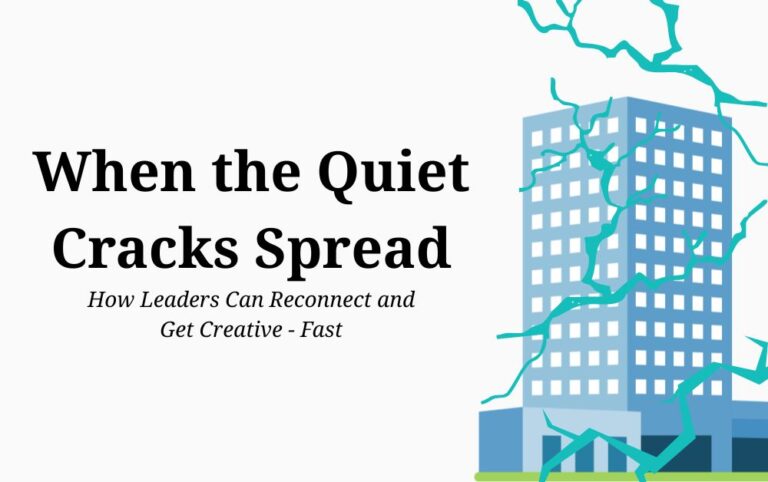
Knee-Deep Thinking: Why Staying Shallow Holds Us Back
Safe feels easy, but the real growth happens when we wade deeper.

This article was originally posted on August 20th, 2025 on my Substack “The Deeper Thinking Project”. Join my substack to get early access to all of my blogs before they are released here! I hope you enjoy this blog and happy leading!
When I was fresh out of college, I landed my first “real” job in marketing. I had the title, the desk, and exactly zero clue what I was doing. Every day felt like a mix of adrenaline and panic. I scribbled notes during every meeting, asked questions that probably sounded ridiculous, and soaked up any scrap of wisdom my boss let slip in conversation.
I was, in every sense, an apprentice.
Years later, I stumbled across Ernest Hemingway’s words:
“We are all apprentices, in a craft where no one ever becomes a master.”
It hit me hard.
Because in leadership, it’s dangerously easy to forget that truth. We start believing our experience has “earned” us a kind of mastery—and while confidence is important, certainty can be a trap. The more we see ourselves as experts, the less likely we are to approach situations with curiosity, humility, and empathy.
And when empathy fades, communication and listening are the first areas on our report cards where we start to get an F.
The leaders I work with who embrace The Deeper Thinking Advantage—curiosity, creativity, critical thinking, and connection—don’t just keep learning; they lead like apprentices. They remember what it felt like to be “young, scrappy, and hungry” (thank you, Hamilton). They remember the uncertainty, the eagerness, the need for someone to believe in them. And because they remember, they listen better, communicate more clearly, and build workplaces where deeper thinking thrives.


Think about the last time you were brand new at something—learning a complicated piece of software, taking on a project that felt bigger than your skill set, or walking into a meeting where everyone else seemed to know the secret handshake.
When you’re new, you listen harder. You ask better questions. You notice things others miss. You’re more willing to admit you don’t know it all.
That’s the apprentice mindset, and it’s leadership gold.
But here’s the danger: the longer we lead, the more tempting it is to switch into “expert mindset.” We rely on past wins instead of present awareness. We stop asking questions because we think we already know the answers. And without even noticing, we start talking more than we listen.
Research supports this – leaders who maintain a learner’s mindset report stronger communication, higher engagement, and greater trust from their teams. Apprentices don’t fake listening; they have to listen to grow. And when leaders model that same curiosity, they send a clear message: Your voice matters here.

The apprentice mindset isn’t just a nice idea—it’s a skill set you must practice and use. Here’s how to weave it into your leadership:
1. Remember When?
Remember the job where you stayed late redoing something you weren’t sure was right? Or the time you nodded along, pretending to understand an acronym you’d never heard before? Write down a few of those moments.
Then, share one of those stories with your team—not as a “look how far I’ve come” brag, but as a reminder: I’ve been there too. Vulnerability builds trust, and trust is the foundation for deeper thinking.
2. Remember what?
In your next 1:1 (yes, you need to take time for 1:1), instead of “Here’s what I think,” try:
Then (this is the hard part, I know) shut up and listen. Listening without defending or explaining allows apprentices to absorb and learn. Don’t interrupt mid-conversation. Allow the speaker to absorb, reflect, and apply.
3. Remember who?
Block an hour to sit alongside a team member whose work you don’t usually see. Ask them to walk you through a day in their role. Notice the hidden challenges, the small wins, and the decisions they make without fanfare.
Not only will this deepen your appreciation, but it may uncover new ways to improve processes, communication, or support. And yes—they’ll feel valued simply because you took the time.
4. Remember What?
Once a month, flip the hierarchy. Invite someone from your team to teach you something—a tool, a workflow, or even a personal skill outside of work. This shows that you value their expertise, reminds everyone that learning is a lifelong process, and keeps humility alive in your leadership. And, you might learn something in the meantime.
5. Remember Why?
Build “Curiosity Checkpoints” Into Your Week
Set a recurring reminder on your calendar to ask yourself:
These checkpoints keep you from drifting into autopilot.
6. Remember the Time When?
Celebrate Learning, Not Just Outcomes
When someone tries a new approach, don’t just focus on whether it worked. Recognize the effort, the risk, and the deeper thinking behind it. “I love how you approached that problem differently” can be just as motivating as “Great job hitting that target.”

Every one of these practices reinforces the message: I’m not done learning, and neither are you. That mindset doesn’t just make you more relatable—it creates a culture where curiosity is welcome, listening is expected, and deeper thinking becomes the norm.
The truth is, mastery is a myth. The best leaders are perpetual apprentices—curious enough to ask, humble enough to listen, and wise enough to know they don’t have all the answers.
Lead like that, and you won’t just get better results—you’ll build a workplace where people feel seen, heard, and motivated to bring their boldest, deepest thinking to the table.
Because deeper thinking changes everything.
I’m Katie Trowbridge, and I am the president and CEO of Curiosity 2 Create, a nonprofit organization offering professional development and coaching for educators and administrators. This blog was first uploaded to my Substack “The Deeper Thinking Project.” If you liked this content, please sign up for my Substack to get early access to posts like this one!
We use the CREATE Method, an ESSA Level 4 backed method that reduces chronic absenteeism, improves student engagement, and increases student academic performance using our CREATE Method model. Schedule a call here to learn more about how Curiosity 2 Create and the CREATE Method can help you and your school today.
Share Post:

Safe feels easy, but the real growth happens when we wade deeper.

I can still picture it—walking through my northwest Chicago neighborhood with friends,

A lighthouse doesn’t shine just for decoration; it exists because lives depend